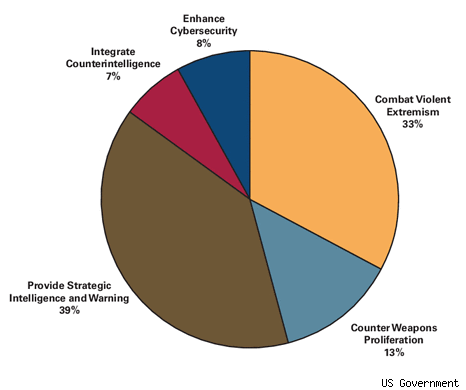aNewDomain.net — Less money, less spying. That’s what James Clapper, director of U.S. National Intelligence, implies when he talks about projected spending cuts for U.S. surveillance activities.
But is it a promise or a threat? Depends on who you ask.
Said Clapper:
We’ve been in a decreasing budget cycle and it will continue … we told our national leaders that we were not going to do more with less … we’re going to do less with less … customer No. 1 (U.S. President Barack Obama) has gotten schooled up on what GEOINT can do for him.”
Check out this piece in Directions Magazine for more on Clapper’s statements.
Meanwhile, back at Congress …
And now, under heavy pressure from outraged Americans and privacy advocates, the Congress judiciary committee has passed the bill known as the USA Freedom Act, which theoretically would limit local USA surveillance. What it is in practice will be intriguing to unravel in the days, weeks and months ahead.
So far, at least, the privacy watchdogs over at the Electronic Frontier Foundation (EFF) are pleased. In a statement, the EFF said:
We’re pleased by Congress’ strong step toward ending bulk surveillance of phone records of Americans. This bill is a good start toward reforming an out-of-control surveillance state, and we urge members of Congress to support it as the bill moves forward through the legislative process.”
Click here for information on where the USA Freedom Act bill is as it moves through Congress.
The pressure from Congress to get information on the intelligence-spending habits of the United States is increasing, too. It has been virtually impossible over the years to actually see where the money goes. Only a single dollar figure — of all spending everywhere — was ever released publicly and to Congress. This will be a key area to watch in coming months.
It all sounds optimistic, but consider the recent words of General Keith Alexander, who left his post as head of the NSA last month. He is still defending the NSA, saying that the NSA has been “villified and misrepresented in the press” and mainly is guilty of “terrible public relations” in explaining the issue to the public. For more on his comments, check out this piece at AFR.org.
The New York Review of Books recalls another former NSA and CIA director’s perspective:
When I quoted Baker at a recent debate at Johns Hopkins University, my opponent, General Michael Hayden, former director of the NSA and the CIA, called Baker’s comment “absolutely correct,” and raised him one, asserting, “We kill people based on metadata.”
Spin, Schmin …
Bear in mind, though, that there are 16 distinct civilian spy agencies in the United States. All collect meta data and they spend untold sums of money in their surveillance activities. And then there’s military-intelligence spending on top of that.

Image credit: U.S. Government
Yet when Congress gets the bill and is asked to approve the spending, it receives one lump sum to approve. According to WikiLeaks and The Washington Post:
$52.6 billion was set aside for operations in fiscal year 2013 [for the black budget]. Among the biggest priorities for the intelligence community, the Post reported, are ‘offensive cyber operations’ and research devoted to decoding encrypted communications.”
Thanks to NSA electronic-surveillance whistleblower Edward Snowden, who revealed to the world various NSA programs for spying on email and other electronic communications last June, some members of Congress are hungry for details.
Stay tuned.
For aNewDomain.net, I’m David Michaelis.
Based in Australia, David Michaelis is a world-renowned international journalist and founder of Link Tv. At aNewDomain.net, he covers the global beat, focusing on politics and other international topics of note for our readers in a variety of forums. Email him at DavidMc@aNewDomain.net.













